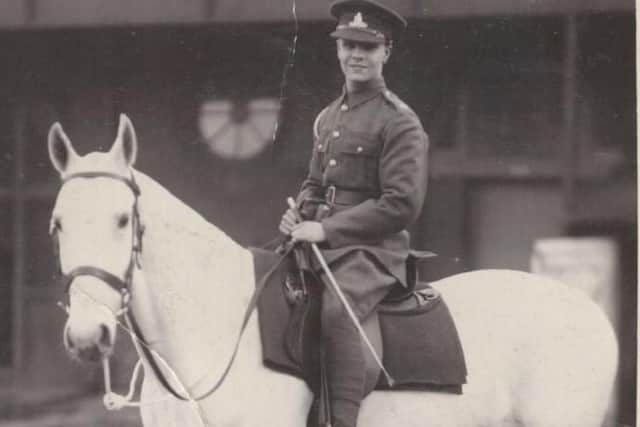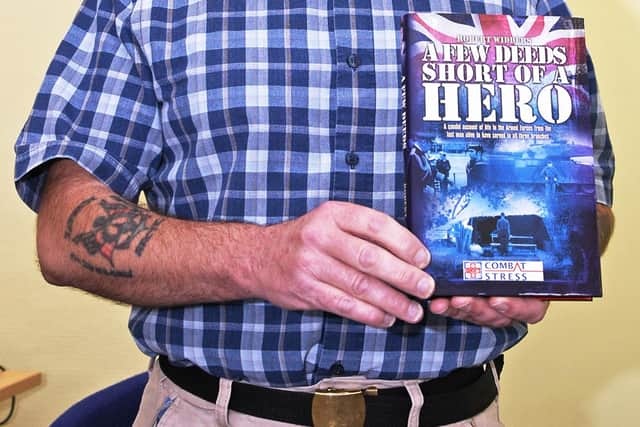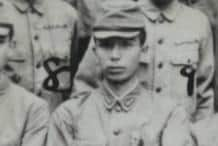Author Robert Widders' book tribute to Doncaster soldier who survived horrors of Japanese PoW camp
and live on Freeview channel 276
Writer Robert Widders, who formerly lived in Hexthorpe, has just published his book, Forged in Blood and Music, about Joe Denton, who was from Denaby Main. Robert has served in all three armed services
Joe, who fought in the battle for Hong Kong, became a prisoner of war, survived the Lisbon Maru massacre, became a volunteer medical orderly and starred in musicals and concerts performed in a Japanese death camp.
Advertisement
Hide AdAdvertisement
Hide AdAs a volunteer medical orderly, Joe's duties included having to force the bodies of his dead friends into barrels to be taken to the crematorium.


The book also talks about his role in the concerts that the PoWs performed in the death camps. On one occasion a guard was displeased with the show, so he broke Joe's skull with a metal bar.
Joe came to Rotherham straight after the end of the war looking for his family, but his father had died while he was a prisoner. Joe ended up running a butcher's shop in Denaby Main.
Joe Denton was among the 1,816 British prisoners of war who were sent to Japan on the Lisbon Maru, on September 27, 1942, to be used as slave labour in Japanese industry.
Advertisement
Hide AdAdvertisement
Hide AdA week later, 828 men were dead. Over the following two-and-a-half years, many more died as a result of torture, brutality, starvation, overwork and lack of medical treatment.


Joe had been captured in Hong Kong when the garrison were finally ordered to surrender on Christmas Day 1941 after fighting a fierce campaign against overwhelming odds. Then he was imprisoned in Shamshuipo along with many comrades from the Royal Artillery.
He was on board the Lisbon Maru on October 1, 1942 when the ship was torpedoed off the cost of China. The PoWs were kept down below in the holds, using pumps to try to keep water from the sinking ship. Trapped in total darkness for 24 hours, without food or water, many men died.
Eventually a group of prisoners managed to break free, killing their guards and rescuing the others.


Advertisement
Hide AdAdvertisement
Hide AdJoe swam for around 10 hours and made it to a little island. The survivors were picked up by the Japanese Navy and transported to Japan. Joe was sent to Kobe House PoW camp.
He served as a volunteer medical orderly in a tiny room that the Japanese authorities allocated as a hospital. The orderlies had to do the best they could with no beds, equipment, dressings, medicine or even toilet facilities.
Robert writes: “During that first winter in Kobe over 100 men died from the combination of overwork, disease and starvation. For Denton, working, sleeping, and eating there, 24 hours a day, it must have felt more like a charnel house than a hospital.”
Over the next couple of years, as the rate of illness and deaths slowly eased, Joe joined with a group of friends to put on concerts and entertainments for the other PoWs.
Advertisement
Hide AdAdvertisement
Hide AdHe had been a child music hall star and was a gifted singer and performer. There were quite a few other talented men at the camp.
Robert writes: “At first the Japanese camp administration refused to allow the men any forms of entertainment. However, they eventually relented in the face of persistent diplomatic pressure and agreed to allow some concerts.
“Most of the men in the camp were sent out daily to work in factories or on the docks. Aside from trying to steal food to alleviate the effects of the starvation rations, they did what they could to commit minor sabotage knowing that to be caught could mean a death sentence.
"But in conditions where maintaining the ‘will to survive’ was paramount in staying alive, Denton’s way to hit back against the Japanese was by inspiring and uplifting his friends’ morale through music and comedy.
Advertisement
Hide AdAdvertisement
Hide Ad“Denton, along with some other men, put on occasional concerts, and even a pantomime. Aside from songs and music, they performed comedy sketches in which they subtly satirised the corruption and incompetence of their captors.
“Many of the Japanese Army guards would watch the shows, and on one occasion a particularly brutal guard, nicknamed the Pay Sergeant, took exception to the humour.
“He made the entertainers line up and beat them all with fists, boots, and a metal bar. Still enraged though, he smashed him Denton over the head with the bar and broke his skull.
“Denton recovered from his injury and soldiered on for the rest of the war, still in captivity, still caring for the sick and dying, and still entertaining his comrades.
Advertisement
Hide AdAdvertisement
Hide Ad“Eventually Kobe House PoW camp was destroyed by the US Air Force in a massive napalm-fuelled raid that devastated the industrial areas of Kobe.
"After the Japanese surrender the PoWs were eventually repatriated. Tragically, some of the men died in plane crashes whilst returning home.
"One of Denton’s closest friends, ‘Scouse’ Maher wrongly thought that Denton had died amongst these men. Denton searched for Maher unsuccessfully after the war and each man went to the grave thinking the other long dead.”
Robert said it took Joe a long time to settle but he eventually enjoyed a long and blissfully happy marriage.
Advertisement
Hide AdAdvertisement
Hide AdHe was also sustained by the friendships forged among the horrors of the prison camp. One man, ‘Flo’ Florence, had been by Joe’s side in Kobe House hospital.
Robert writes: “Florence died in 1985 from illness which stemmed back to the effects of imprisonment. Joe was able to be at his pal’s bedside not long before he died.
"Both men had faced death side by side so many times before during war and captivity, and there can be no pretence between men like these.
"And the two men simply hugged and thanked each other for their friendship. It was a proud goodbye in a very British stiff-upper-lip tradition that has faded away itself along with the men of character that upheld it.
Advertisement
Hide AdAdvertisement
Hide Ad" Eventually, some years later, Denton passed away himself from heart disease brought on by his former captivity.”
Forged in Blood and Music by Robert Widders is available on Amazon for £8.99 paperback. Website: www.robertwidders.co.uk
A message from the Editor:
Thank you for reading this story on our website. While I have your attention, I also have an important request to make of you.
With the coronavirus lockdown having a major impact on many of our advertisers - and consequently the revenue we receive - we are more reliant than ever on you taking out a digital subscription.
Advertisement
Hide AdAdvertisement
Hide AdSubscribe to The Star website and enjoy unlimited access to local news and information online and on our app. With a digital subscription, you can read more than 5 articles, see fewer ads, enjoy faster load times, and get access to exclusive newsletters and content.
Visit https://www.thestar.co.uk/subscriptions now to sign up.
Our journalism costs money and we rely on advertising, print and digital revenues to help to support them. By supporting us, we are able to support you in providing trusted, fact-checked content for this website.
Thank you
Nancy Fielder, editor
